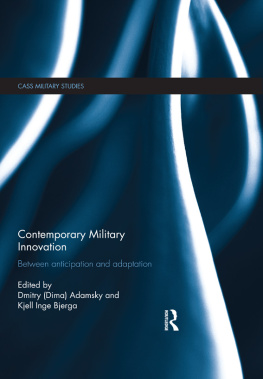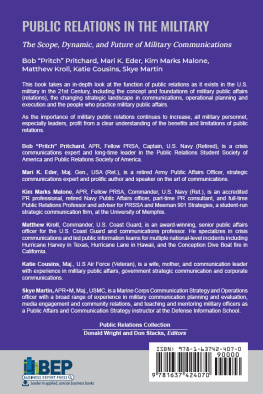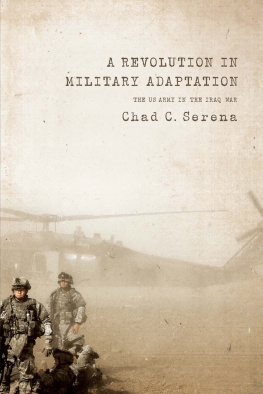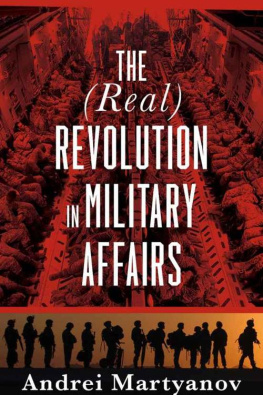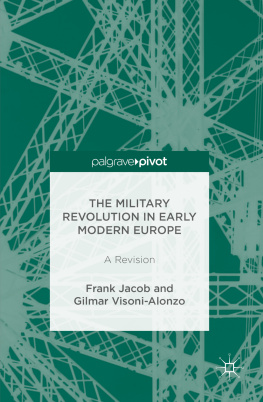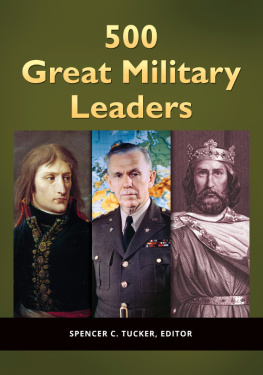INFORMATION AND REVOLUTIONS IN MILITARY AFFAIRS
Like the industrial revolution before it, the information technology revolution appears to be creating a new ruling class, a new economy and a new society. Information and Military Affairs provides a cutting edge account of how our current information revolution is transforming military operations and warfare. A vast literature on the revolution in military affairs (or RMA) cites the dominant role of information technology in enabling a so-called new military revolution. This volume challenges this conventional wisdom, and argues that its impact cannot in fact be regarded as new.
Instead it takes the compelling view that previous periods of military revolution may also be characterized as information revolutions. Through the close examination of six case studies of military transformation during the industrial age, the contributors to this volume demonstrate how the employment of emerging information systems was critical to realizing a major boost in military effectiveness. The most successful adaptations to the new environment were made by the most skillful users of information.
Drawing upon the expertise of leading military historians, political scientists and defense practitioners this book provides the reader with a selection of finely crafted, insightful and thought-provoking essays which provide the first retrospective examination of how information has affected the process of military revolution through the ages.
This is a special issue of The Journal of Strategic Studies.
INFORMATION AND REVOLUTIONS IN MILITARY AFFAIRS
Emily O. Goldman
First published 2005
by Routledge
2 Park Square, Milton Park, Abingdon, Oxon OX14 4RN
Simultaneously published in the USA and Canada
by Routledge
270 Madison Ave, New York, NY 10016
Routledge is an imprint of the Taylor & Francis Group
2005 Emily O. Goldman
Typeset in Times New Roman by Elite Typesetting Techniques Ltd,
Eastleigh, Hampshire, UK
Printed and bound in Great Britain by MPG Books Ltd, Bodmin
All rights reserved. No part of this book may be reprinted or reproduced or utilised in any form or by any electronic, mechanical, or other means, now known or hereafter invented, including photocopying and recording, or in any information storage or retrieval system, without permission in writing from the publishers.
British Library Cataloguing in Publication Data
A catalogue record for this book is available
from the British Library
Library of Congress Cataloguing in Publication Data
ISBN 0-415-70139-2
CONTENTS
EMILY O. GOLDMAN
Information Capabilities and Military Revolutions:
The Nineteenth-Century Experience
DENNIS E. SHOWALTER
Inventing the Railroad and Rifle Revolution:
Information, Military Innovation and the Rise of Germany
GEOFFREY L. HERRERA
Transformation and Technology in the Fisher Era:
The Impact of the Communications Revolution
NICHOLAS A. LAMBERT
Maritime Airpower in the Interwar Period:
The Information Dimension
GEOFFREY TILL
ROBERT CITINO
JAMES S. CORUM
DAVID ZIMMERMAN
Emily O. Goldman is Director of the UC Davis Washington Program and Associate Professor of Political Science. Her recent publications include The Revolution in Military Affairs in Asia, ed., with Thomas Mahnken (Palgrave, 2004), National Security in the Information Age, ed. (Frank Cass, 2003), and Diffusion of Military Technology and Ideas, ed. with Leslie C. Eliason (Stanford, 2003).
Dennis Showalter is Professor of History at Colorado College, and past President of the Society for Military History. His recent monographs include The Wars of German Unification (London: Hodder Arnold, 2004), and a new edition of his prize-winning Tannenberg: Clash of Empires (Washington DC: Brassey's, 2004).
Geoffrey L. Herrera is Assistant Professor of Political Science at Temple University in Philadelphia. He is the author of several articles on technology and international transformations and of a forthcoming book on the railroad and nuclear revolutions.
Nicholas A. Lambert is the author of Sir John Fisher's Naval Revolution which in 2000 was awarded the Society of Military History's Distinguished Book Award. He is currently residing in the Republic of China in Taiwan.
Geoffrey Till is Professor and Dean of Academic Studies at the Joint Services Command and Staff College, and Head of the Defence Studies Department, King's College London. His most recent books include The Challenges of High Command: the British Experience with Gary Sheffield, and Seapower: A Guide for the 21st Century (Frank Cass, 2004).
Robert Citino is a Professor of History at Eastern Michigan University. He is the author of six books, including Quest for Decisive Victory: From Stalemate to Blitzkrieg in Europe, 18991940 ;(2002) and Blitzkrieg to Desert Storm: The Evolution of Operational Warfare (2004), both with the University Press of Kansas. He is also Book Review Editor for World War II magazine.
James S. Corum is professor of comparative military studies at the US Air Force School of Advanced Air and Space Studies. A Lt. Col. in the US Army Reserve, he is author of The Roots of Blitzkrieg (1992), The Luftwaffe: Creating the Operational Air War (1997), The Luftwaffe's Way of War (1998) and Airpower in Small Wars, with Wray Johnson (2003).
David Zimmerman is Professor of Military History at University of Victoria. His monographs include Top Secret Exchange: The Tizard Mission and the Scientific War (Montreal, 1996), and Britain's Shield: Radar and the Defeat of the Luftwaffe (Stroud, 2001). He is currently writing a history of the Royal Canadian Navy in the Pacific from 1945 to 1968.
EMILY O. GOLDMAN
Dramatic advances in telecommunications and data processing, collectively known as information technology, lend credence to the idea that we are in the midst of an information-based Revolution in Military Affairs (RMA). The exploitation of advances in information technology is producing greater knowledge, and when linked with precision weaponry, is transforming the way wars are fought by the world's leading military powers. Strategic thinkers and security experts have been discussing and debating the impact of information technology on military operations and warfare ever since the late 1970s when Soviet General Nikolai Ogarkov argued that a range of recent innovations would become as important to waging war as nuclear weapons. These innovations included new kinds of explosives, precision-guided weaponry, advances in C3I (command, control, communications and intelligence), sensor technology and automated control systems, and weapons based on new physical principles (e.g., particle beams and lasers).
US high-tech weapons in the 1991 Gulf War, particularly the unprecedented integration of precision-guided munitions and C4I (command, control, communications, computers and intelligence), seemed to confirm that an RMA was underway. By linking advances in precision weapons, surveillance satellites, computer-based information processing and organizational changes that network military units, this information RMA could provide greater efficiency and flexibility, and fewer risks of casualties through the use of more highly-skilled troops and smart technologies.


